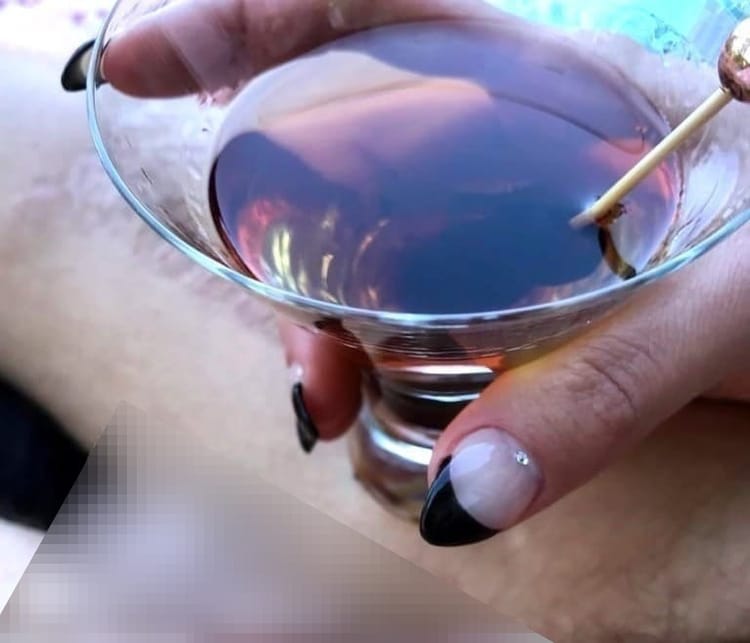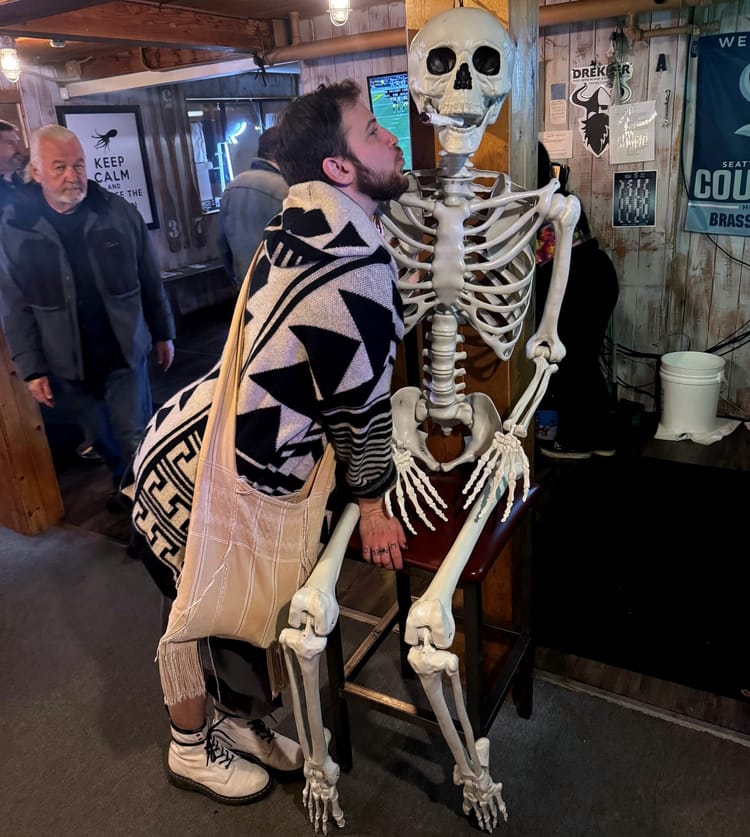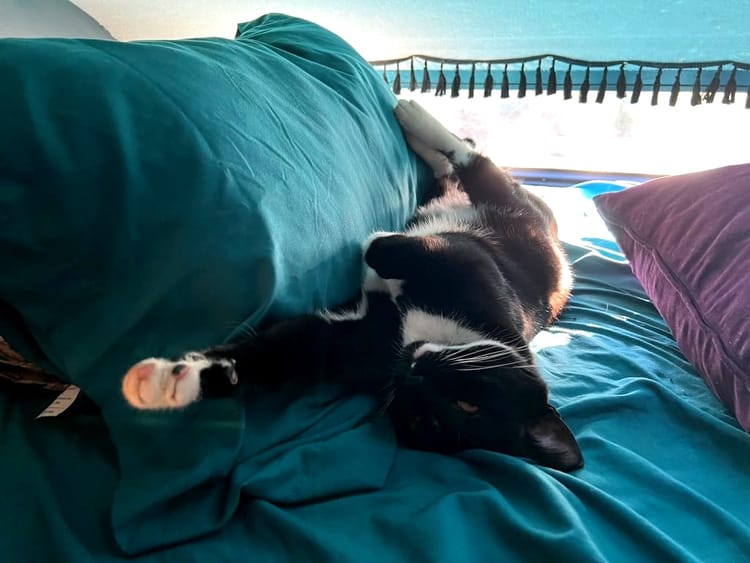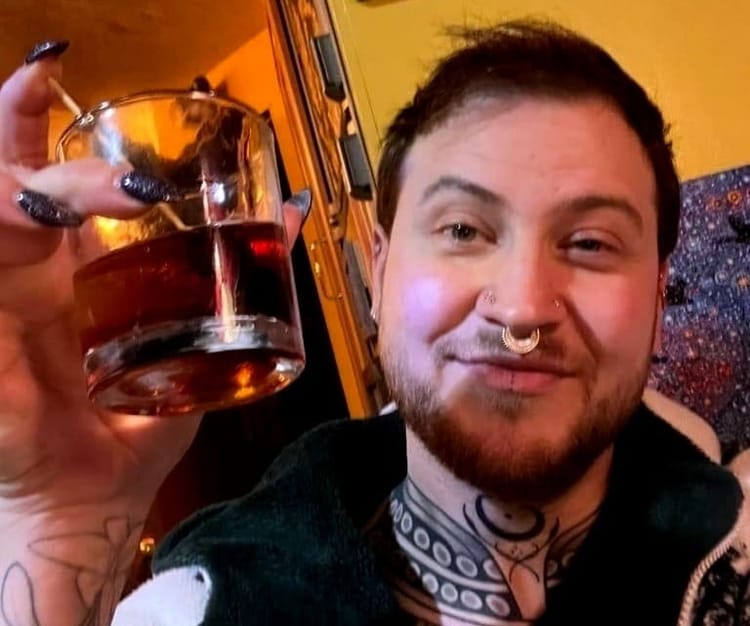Two in the Morning in Budapest (A Gay Trans Psychedelic-Integration White Indigenous Hot-Spring Pilgrimage)

MY FIRST NIGHT in Budapest, I woke up missing a rapist.
I’d been having panic attacks for days before I left, and had spent the overnight on the plane curled and chanting I AM something; I am SOMEONE, over and over inside my head. Some of it was that I was leaving the country for the first time since transitioning, and then I got stopped for an extensive feel-up and shakedown by TSA when the X-ray machine flagged me as an “anomaly.”
“I mean, different,” the TSA agent corrected himself, feeling bad about having called my body an anomaly after I told him, no—I was just trans.
But certainly, the panicking was altogether an unentangle-able mix: real-time fear for my safety as a traveling trans person, historical fear embedded in my nervous system as a survivor of childhood sexual abuse, plus a trans survivor of child sex abuse with my transness being, in the explicit words of said rapist, a reason, or sometimes the reason, he was forced (by whom, he did not say, and so, it seemed to me, by God) to rape me. And then, I woke up missing him.
If I was honest with myself—which I started being almost as soon as I shot up in the hotel bed during a back-to-sleep meditation, which I’d tapped in an app after waking up agitated, only to relax my way into the worse feeling I’d been trying to avoid—I’d been missing him for a long time. I’d been panicking because some subconscious defense mechanism knew that if I knew that, it would rip me open a bit, and it had started to leak out as I’d gotten ready to leave home. Then earlier that evening, my first night in Budapest, I’d spent an hour circling thermal pools of increasing temperatures under the domed cupola of Rudas Bath, scooped out of stone some 500 years ago by the Turks. I had warmed and softened in the dim light, surrounded by men in white, backless bathing aprons. And so here it was, finally, leached right out of the tissues that had gripped and sold it to me like my life depended on it, because while I was close to him, it had: longing for him.
I loved him. That, I already knew, though I don’t say it to myself too often. I had been a child, and so he had been formative. I hated him, also, of course, but I’d survival-oriented toward the things about him to appreciate, attentive eyes, soft voice, as long as I stayed on the right side of compliance. And I had acknowledged to myself previously that I missed him, but not how I missed being so completely enveloped—literally, psychologically, yes catastrophically and violently, but totally; no one, it is a fact, could ever do that to me again, because no adult is three times taller than my adult body. And no matter how I ever tried, even if I tried, I could not recapture the level of vulnerability I inhabited as a kid.
It’s unbelievable, that it’s not repeatable. It’s wonderful news.
I hadn’t left the country in the years since I’d started remembering his abuse, and now I was far away and embodied enough to feel the absence of his fearsome everywhereness. It was so endemic to my experience that the space it left gaped, like loss. It unleashed even bigger loss—of the peace, of the freedom of being without it, now; of having been forced to live without those before. Finally feeling the grief, I sobbed as it tore through me, alone in my hotel bed in the middle of the night.
THE SECOND NIGHT in Budapest, I stopped on the way home from a different thermal bath house—the 100-year-old, art-nouveau-tiled Gellért—on a whim for a glass of prosecco. The brick-walled, wood-ceilinged bistro had caught my attention as I walked past because of the band I could see playing through the window; I stood outside on the sidewalk, hiding from the windows’ views, for at least five minutes in the February cold, considering. Leaving Gellért in the dark, I’d thought I’d get in bed, have some tea, and cry. This is what I’d been doing, essentially, for the last six years, since I started allowing myself to remember what my childhood had really been like. Before that, I’d been something of a good-time Charlie, ready for a karaoke mic or a couple of martinis once or twice a week, until I started drinking a little too much, and then started working a lot too much, and then converted the drinking into stone cold sobriety and the working into a sort of wellness-workaholism, taking time off from employment to put every ounce of energy and effort into yoga and therapy and plant medicine and hot springs and bodywork and anything else that might sustain me while floods of memories surged.
But now, the second night in Budapest, I was suddenly having a vision of a sparkly glass of white wine. I debated with myself outside. I didn’t drink anymore. I had never been a drinker of something like that. I had absolutely nothing to do or anywhere to be. But drinking led to hangovers, some part of me protested. There was the omicron variant of the coronavirus, and I hadn’t been in an indoor bar or restaurant but once in the whole pandemic. This bistro was pretty empty; it was early, at 7 p.m., for European dinner.
Ultimately, I went in. It was warm, and a tiny white dog barked at me once, then curled at the legs of my chair. The barmaid (am I really gonna call her that? That really was her vibe) seemed impressed that he liked me. His name, she said, was Kevin. Kevin Costner. She said, “He’s the bodyguard.”
The night before, at Rudas, I had asked my ancestors to keep me safe, breathing the air with the other supposedly vaccinated bathers. Please, if you can, I’d said to them. Please, I need to do this. The other men—like most weeknights, it was men’s night, not a night I’d previously have been welcome, but I’d had five surgeries in forty months that made me look more like them—they looked up as I waded in, different because I wasn’t in a pack like most of them were, different in a speedo instead of the assless apron Hungarians favor. I was different in ways they could hardly fathom.
I was held by the water just the same. I’d asked my ancestors for protection again this next night at Gellért, coed maskless shared air in the underground chamber, steamy under tiled arched ceilings and frescoes and statues, fountains in blues and whites, burgundies and golds. I was picking my risks carefully, and also I was letting go to an unprecedented extent. I was practicing faith. That somebody had my back. That, despite everything that had happened, someone always had.
Lately, I’d been feeling my great-great-grandfather. He was born here in Hungary, to parents listed as Roman Catholics on his baptism certificate, and he’d moved to the United States and had a pile of kids who created heaps of grandkids who were Catholic, too, and so on down to my own baptism, confession, communion, and confirmation. But there was a rumor, passed along and still held by the oldest ladies left in his line, ages ninety-five and ninety-seven, that he actually came from Jews. I’d become aware of this rumor only recently, after taking a DNA test that suggested I did, too; one of his great-grandchildren’s tests, I learned once I started calling distant relatives, had suggested the same. Earlier that day, before the impromptu prosecco, and before the churchlike Gellért bath, I’d walked to Budapest’s Great Synagogue, which I hadn’t consciously known was 500 meters behind the hotel I’d booked. As I approached, even from across the street I was smacked with a grief that arose from my own cells but also, I recognized, did not originate with me.
I don’t know who my great-great-grandfather left behind when he left Hungary around 1890. The records, several relatives who’ve gone looking say, are mysteriously absent further back than him. I do know that anyone he left, he never saw again. I do know that of all the countries in the world he could have ultimately landed in—he first went to South America, apparently, but something wasn’t quite right there, Grandfather, whether you could put your finger on it or not before you decided to emigrate north—he positioned me to be born in the best country in this world to be me.
My great-great-grandfather was a Charlie—Charles, he changed his name to, from Carolus, in the United States. I don’t know if he was a good time. I know that I effervesced with thanks while I sat in the brick-walled bistro in Budapest, toasting him.
After, I went back to the hotel, and again slept three hours before waking up in the middle of the night. This time, I had no idea where I was, and I found myself running through an index of countries where I’d been, which I used to do sometimes when I woke up in the days I was traveling fast and far for work. When I first awoke, I thought clearly: I’m home, before my brain kicked in with the logic that home is California, and I wasn’t in California. In the weeks between when I’d bought my ticket to Budapest and left, I’d found myself stopping myself when writing or texting “I’m going to Hungary” from the instinct to end the sentence instead with home. To write, I’m going home.
“For much of the whole century some of these Jews were alive, the world hadn’t wanted them, either.”
THE THIRD NIGHT in Budapest, I woke from a dream that I’d taken a woman’s breast into my mouth so deep her nipple touched the back of my throat. I could feel the pleasure she felt; I have dreams like this sometimes, where I’m touching a woman and I can feel in my body how it feels in her body, my sensations mirroring the responses of her parts, which I used to have.





